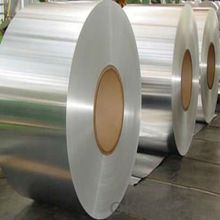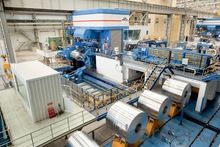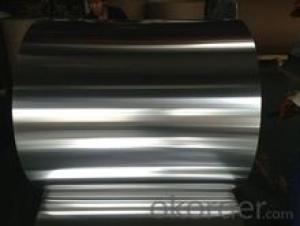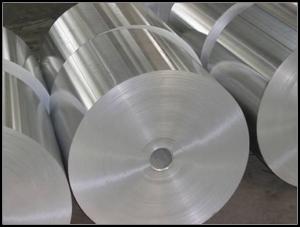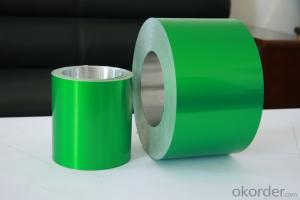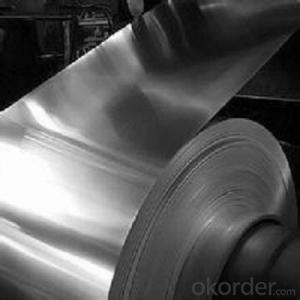50 Mil Aluminum Coil Coated - 1050,1060,1070,1100 Aluminum Coil/Strips DC & CC CNBM
- Loading Port:
- Qingdao
- Payment Terms:
- TT OR LC
- Min Order Qty:
- 100 set
- Supply Capability:
- 300000 set/month
OKorder Service Pledge
OKorder Financial Service
You Might Also Like
Quick Details
| Brand Name: | cnbm aluminum coil | Model Number: | 1xxx alloy | Thickness: | 0.1mm~10mm |
| Width: | 950mm~2200m | Alloy Or Not: | Is Alloy | Grade: | 1000 Series |
| Temper: | O - H112 | 1xxx 1050.1060.1070.1100 alloy: | aluminum coil |
Packaging & Delivery
| Packaging Detail: | Standard Export Packaging/Eye to Ske or Eye to Wall |
| Delivery Detail: | 15~25 Days after received order |
Products are widespread applied in mechanical, electric, transportation, construct, printing, packaging and other field. Applied specifically for beverage can, container, theft-proofing cap, cigarette package, commodity package, medicine package, etc;various uses of capacitors in power electronics industry; the flat sheet,corrugated plate,embossed plate in field of building’s structure, the PS plate in field of printing’s ; the household electrical appliances,daily aluminum products in Light industries, etc; as well as in field of mechanical, transportation, aviation and aerospace, aluminum foil is also used as a functional and structural material.
Specifications
Aluminum Coils - DC & CC
1) Alloy: 1xxx,1050,1060,1070,1100.1235
2) Temper: 0. H12. H14. H16. H18. H22. H24. H26. H32.H34
3) Thickness: 0.1~10mm
4) Width: 25~2100mm
5) Inside Diameter Min: 150mm
7) Outside Diameter Max: 2400mm
8) Dimensions can be produced according to clients' specifications
9) Good plasticity, conductivity
10) Generally used in industrial and construction applications
11) Packing: Standard Export Packing
12) Payment: T/T, L/C at sight
Alloy | Thickness(mm) | Width(mm) | Temper | DC & CC |
1050,1060,1070,1100,1235 | 0.1-10.0 | 25-2200 | O,H12,H14,H16,H18,H22,H24,H26,H32,H34 | DC, CC |
2.5-10.0 | 950-2300 | F, H111,H112 | DC | |
3003,3004,3102,3104 | 0.1-10.0 | 25-2200 | O,H12,H14,H16,H18,H22,H24,H26,H32,H34 | DC, CC |
2.5-10.0 | 950-2300 | F, H111,H112 | DC | |
5052,5083,5754,5005,5182 | 0.1-10.0 | 25-2200 | O,H12,H14,H16,H18,H22,H24,H26,H32,H34 | DC |
2.5-10.0 | 950-2200 | F,H111,H112 | DC | |
8011,8079 | 0.1-10.0 | 25-2300 | O,H12,H14,H16,H18,H22,H24,H26,H32,H34 | DC,CC |
Application | Mainly in printing(PS plate base), Aluminum-plastic composite panel base, construction, decoration, capacitor, cover material, deep drawing products, refrigeration, air conditioner, automobile etc. | |||

- Q: Are aluminum coils suitable for architectural louvers?
- Indeed, architectural louvers can be constructed using aluminum coils as they possess remarkable corrosion resistance, a lightweight composition, and a commendable strength-to-weight ratio. The malleability and manipulability of aluminum coils grant them the ability to be effortlessly shaped and fabricated into diverse forms and dimensions, thereby rendering them exceptionally suitable for fashioning aesthetically appealing and practical louvers. Moreover, the robustness of aluminum guarantees that the louvers will endure severe weather conditions and retain their structural integrity for an extended period. In conclusion, aluminum coils serve as a dependable and adaptable material choice for architectural louvers.
- Q: Can aluminum coils be used in the production of aluminum curtain walls?
- Yes, aluminum coils can be used in the production of aluminum curtain walls. Aluminum coils are typically used as the raw material in the manufacturing process of aluminum curtain walls. These coils undergo various processes, such as rolling, cutting, and shaping, to create the desired components of the curtain wall system. The lightweight and corrosion-resistant properties of aluminum make it an ideal material for curtain walls, as it provides structural stability, durability, and aesthetic appeal to the building façade. Overall, aluminum coils play a crucial role in the production of aluminum curtain walls, ensuring the quality and performance of the final product.
- Q: What are the different thickness options for aluminum coils?
- Various industrial and commercial applications can be catered to with a wide range of thickness options for aluminum coils. The thickness of these coils is typically measured in gauge or millimeters (mm). Aluminum coils are available in different thickness options: 1. Thin Gauge: Coils with a thin gauge usually have a thickness ranging from 0.15 mm to 0.4 mm. These coils are commonly utilized in applications that necessitate lightweight and flexible materials, such as packaging, electrical wiring, and insulation. 2. Standard Gauge: Coils with a standard gauge have thicknesses ranging from 0.4 mm to 2.5 mm. They find widespread use in industries like construction, automotive, and aerospace for applications like roofing, cladding, heat exchangers, and structural components. 3. Thick Gauge: Coils with a thick gauge typically have a thickness above 2.5 mm. These coils are predominantly employed in heavy-duty applications that require high strength, durability, and load-bearing capacity. Examples include shipbuilding, industrial machinery, and large-scale structural frameworks. It is important to note that the availability of specific thickness options may vary depending on the manufacturer and the intended application. Additionally, custom thicknesses can be manufactured to meet specific project requirements.
- Q: How to calculate the dosage of paint for aluminum coil coating? If the weight is 1 ton, the density 2.71 and the thickness 0.12mm, how much paint is needed?
- Coating surface area S*0.12(thickness)*ρ(density) / solid(paint solid)=actual paint consumption brush and roller paint: 100% spray paint: calculated value*70%
- Q: Why the end of the aluminum coil will have a yellow spot?
- The reason may be that the manufacturer is not cleaned, and must be carefully cleaned before coating, or there may be paint fall off phenomenon.
- Q: How are aluminum coils used in the production of automotive heat shields?
- Aluminum coils are used in the production of automotive heat shields as they provide excellent thermal conductivity and heat dissipation properties. These coils are shaped into specific patterns or designs and then attached to the heat shields to effectively reflect and reduce the transfer of heat from the engine or exhaust system to other sensitive components in the vehicle. The use of aluminum coils in heat shields helps in maintaining optimal operating temperatures, enhancing overall performance, and preventing potential damage or fire hazards.
- Q: How much cube is the 0.9mm aluminum rolling?
- This is a common problem. Anyone who had received high school education can calculate it very quickily. One way is to calculate sectional area with circular area, then times the thickness of the aluminum rolling. Another way is to use the outer diameter circular area to subtract the core area and then times the thickness of aluminum rolling.
- Q: Can aluminum coils be used in electrical busbars?
- Indeed, electrical busbars can utilize aluminum coils. Due to its high electrical conductivity, affordability, and lightweight nature, aluminum is widely employed as a busbar material. Aluminum coils can effortlessly be molded into different configurations and dimensions, tailored to meet specific busbar criteria. Furthermore, aluminum possesses commendable thermal conductivity, facilitating efficient dissipation of heat in applications involving high currents. Nevertheless, it is crucial to take into account the current carrying capacity, mechanical strength, and corrosion resistance of aluminum coils when opting for them in busbar applications.
- Q: Are aluminum coils fire-resistant?
- Yes, aluminum coils are fire-resistant. Aluminum has a high melting point of 660 degrees Celsius (1220 degrees Fahrenheit) and it does not burn, making it a non-combustible material. This property makes aluminum coils suitable for various applications where fire resistance is a critical factor, such as in building construction, electrical wiring, and HVAC systems. Additionally, aluminum's excellent heat conductivity helps dissipate heat quickly, reducing the risk of fire. However, it is important to note that while aluminum coils themselves are fire-resistant, they may be used in systems that include other components which may not have the same level of fire resistance. It is important to consider the entire system and follow proper fire safety regulations and guidelines to ensure overall fire safety.
- Q: Can aluminum coils be used for sound insulation?
- Yes, aluminum coils can be used for sound insulation. Aluminum has excellent properties for soundproofing due to its high density and ability to absorb and dissipate sound waves. When used as a coil, aluminum can effectively block and reflect sound, reducing noise transmission and providing insulation. Additionally, aluminum coils can be easily installed and are resistant to corrosion, making them a durable and long-lasting option for soundproofing applications.
Send your message to us
50 Mil Aluminum Coil Coated - 1050,1060,1070,1100 Aluminum Coil/Strips DC & CC CNBM
- Loading Port:
- Qingdao
- Payment Terms:
- TT OR LC
- Min Order Qty:
- 100 set
- Supply Capability:
- 300000 set/month
OKorder Service Pledge
OKorder Financial Service
Similar products
Hot products
Hot Searches
Related keywords


